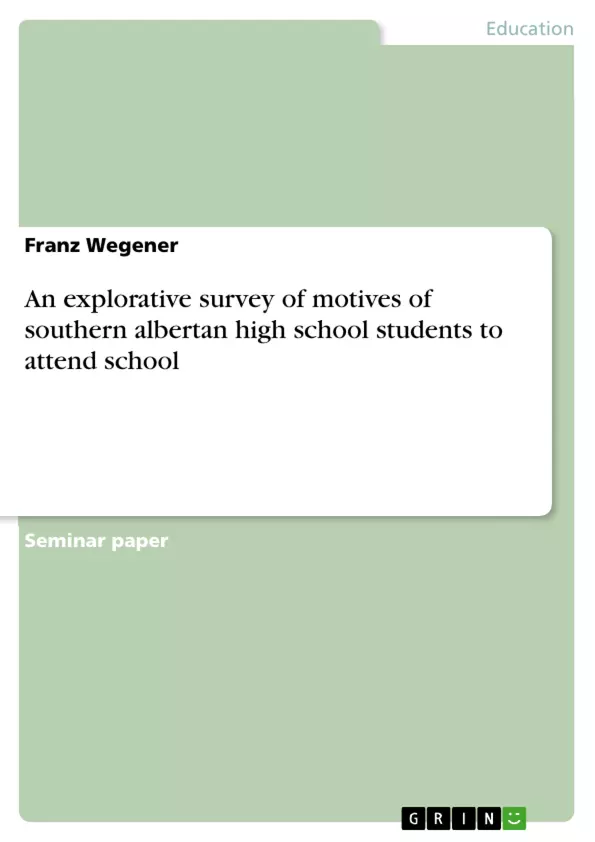Dropping out of school and tardiness are problems that may have severe consequences for the lives of students as well as for the society as a whole. These problems are rooted in the motives of students and the working climate at school. So, the most promising question to ask is: why do successful students go to school? What makes them interested in school and which motives may be dissatisfied? Therefore a survey was carried out at a high school in Lethbridge, Alberta, Canada. In the survey, 63 students (male and female) were asked about their motives to come to school and the satisfaction of these motives. Also, some research was conducted on prior studies. In this way, a cross-cultural comparison between the student’s motives and their satisfaction at the Canadian high school and at two German high schools became possible.
Inhaltsverzeichnis (Table of Contents)
- 1 Content
- 1 Introduction
- 2 Review of the Literature
- 2.1 Prior Studies
- 2.2 The Need for the Study
- 3 Research Design
- 3.1 Research Population
- 3.2 Limitations of the study.
- 3.3 Variable Disturbance
- 3.4 Questionnaire
- 4 Results
- 4.1 Analysis of Data
- 4.2 Interpretation
- 5 Conclusion.
Zielsetzung und Themenschwerpunkte (Objectives and Key Themes)
The aim of this study is to explore the motives of Southern Albertan high school students for attending school. This investigation seeks to understand the reasons behind student attendance, beyond the traditional focus on learning and future career plans, and to explore the potential for cultivating a lifelong learning attitude in students. This study specifically aims to understand how student motives are connected to their satisfaction with their educational experience, and how this might influence factors like dropouts, truancy, tardiness, and educational continuance. The study will utilize a questionnaire to gather data and analyze it to identify the various motives driving students to attend school.
- Student motives and their satisfaction
- The relationship between student motives, satisfaction, and educational outcomes (e.g., dropouts, truancy, tardiness)
- The connection between student motives and their development of a lifelong learning attitude
- The impact of school climate on student attendance and motivation
- The influence of various attendance policies on student behavior
Zusammenfassung der Kapitel (Chapter Summaries)
- Introduction: This chapter introduces the context of the study and highlights the differences between the German and Albertan school systems. It focuses on the contrast between traditional, teacher-centered methods in Alberta and more progressive approaches found in some European schools. The chapter also addresses the existing literature on student dropouts and truancy, emphasizing the need to understand the motivations of the majority of students who do attend school.
- Review of the Literature: This chapter reviews prior research on student motivation, dropouts, truancy, tardiness, and educational continuance. It explores the link between student motives, satisfaction of needs, and these behavioral patterns. The chapter focuses on studies that have investigated the influence of attendance policies and the impact of intrinsic motivation on school persistence.
- Research Design: This chapter outlines the methodology of the study, including the research population, potential limitations, and methods for addressing variable disturbance. It describes the questionnaire that will be used to collect data from students.
Schlüsselwörter (Keywords)
The main keywords and focus topics of this study include student motives, school attendance, satisfaction, dropout rates, truancy, tardiness, educational continuance, lifelong learning, attendance policies, school climate, and intrinsic motivation. This study aims to delve into these areas, seeking to uncover a deeper understanding of the factors influencing students' choices and experiences within the educational system.
Frequently Asked Questions
What are the main motives for high school students to attend school?
Beyond learning and career plans, students are driven by social interactions, intrinsic interests, and the desire for personal development. The study explores these motives in Lethbridge, Alberta.
How does student satisfaction relate to dropout rates?
The research suggests that when students' primary motives for attending school are dissatisfied, the risk of truancy, tardiness, and eventually dropping out increases significantly.
What role does school climate play in student motivation?
A positive school climate is a crucial factor in maintaining student interest and satisfaction, which supports a lifelong learning attitude and reduces problematic behaviors like tardiness.
How does the Albertan school system compare to German schools in this study?
The study provides a cross-cultural comparison, noting differences in teaching methods—such as traditional, teacher-centered approaches in Alberta versus more progressive European methods—and how they affect student motives.
What is the significance of intrinsic motivation for school persistence?
Intrinsic motivation is a key driver for successful students. Understanding what makes them interested in school helps in designing better attendance policies and educational environments.
- Quote paper
- Franz Wegener (Author), 2006, An explorative survey of motives of southern albertan high school students to attend school, Munich, GRIN Verlag, https://www.grin.com/document/56163



